
-
 Japan ramps up tech ambitions with $65 bn for AI, chips
Japan ramps up tech ambitions with $65 bn for AI, chips
-
Taliban govt clearing 'un-Islamic' books from Afghanistan shelves

-
 Asian markets struggle as traders weigh geopolitical tensions
Asian markets struggle as traders weigh geopolitical tensions
-
Iraq holds its first census in nearly 40 years

-
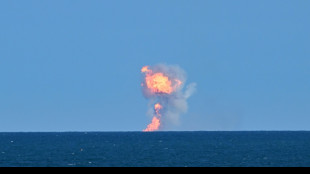 SpaceX fails to repeat Starship booster catch, as Trump watches on
SpaceX fails to repeat Starship booster catch, as Trump watches on
-
European powers, US seek to censure Iran at UN nuclear watchdog board

-
 SpaceX fails to repeat Starship booster catch, as Trump looks on
SpaceX fails to repeat Starship booster catch, as Trump looks on
-
European stocks fall on Ukraine-Russia fears, US focused on earnings

-
 Trump names China hawk Howard Lutnick commerce secretary
Trump names China hawk Howard Lutnick commerce secretary
-
SpaceX set for Starship's next flight -- with Trump watching
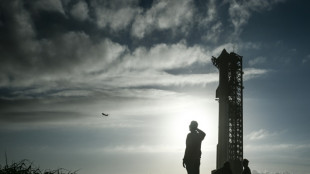
-
 Top-selling daily French daily Ouest-France stops posting on X
Top-selling daily French daily Ouest-France stops posting on X
-
Russian invasion toll on environment $71 billion, Ukraine says

-
 New Botswana leader eyes cannabis, sunshine to lift economy
New Botswana leader eyes cannabis, sunshine to lift economy
-
China's Xi urges 'strategic' ties in talks with Germany's Scholz

-
 COP29 negotiators strive for deal after G20 'marching orders'
COP29 negotiators strive for deal after G20 'marching orders'
-
Walmart lifts full-year forecast after strong Q3

-
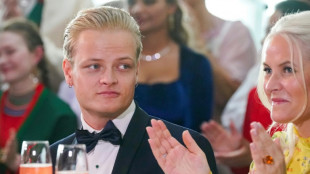 Son of Norwegian princess arrested on suspicion of rape
Son of Norwegian princess arrested on suspicion of rape
-
US lawmaker accuses Azerbaijan in near 'assault' at COP29

-
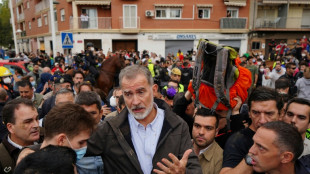 Spain royals to visit flood epicentre after chaotic trip: media
Spain royals to visit flood epicentre after chaotic trip: media
-
French farmers step up protests against EU-Mercosur deal

-
 Burst dike leaves Filipino farmers under water
Burst dike leaves Filipino farmers under water
-
Markets rally after US bounce as Nvidia comes into focus

-
 Crisis-hit Thyssenkrupp books another hefty annual loss
Crisis-hit Thyssenkrupp books another hefty annual loss
-
Farmers descend on London to overturn inheritance tax change

-
 Floods strike thousands of houses in northern Philippines
Floods strike thousands of houses in northern Philippines
-
SpaceX set for Starship's next flight, Trump expected to attend

-
 Several children injured in car crash at central China school
Several children injured in car crash at central China school
-
Urban mosquito sparks malaria surge in East Africa
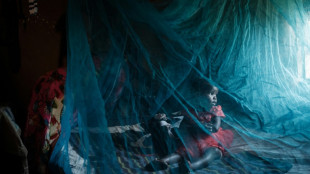
-
 Many children injured after car crashes at central China school: state media
Many children injured after car crashes at central China school: state media
-
Asian markets rally after US bounce as Nvidia comes into focus

-
 Tens of thousands march in New Zealand Maori rights protest
Tens of thousands march in New Zealand Maori rights protest
-
Five takeaways from the G20 summit in Rio

-
 Parts of Great Barrier Reef suffer highest coral mortality on record
Parts of Great Barrier Reef suffer highest coral mortality on record
-
Defiant Lebanese harvest olives in the shadow of war

-
 Divided G20 fails to agree on climate, Ukraine
Divided G20 fails to agree on climate, Ukraine
-
Can the Trump-Musk 'bromance' last?

-
 US to call for Google to sell Chrome browser: report
US to call for Google to sell Chrome browser: report
-
Trump expected to attend next Starship rocket launch: reports

-
 Stocks, dollar hesitant as traders brace for Nvidia earnings
Stocks, dollar hesitant as traders brace for Nvidia earnings
-
Biden in 'historic' pledge for poor nations ahead of Trump return

-
 Tropical storm Sara kills four in Honduras and Nicaragua
Tropical storm Sara kills four in Honduras and Nicaragua
-
Spanish resort to ban new holiday flats in 43 neighbourhoods

-
 Phone documentary details Afghan women's struggle under Taliban govt
Phone documentary details Afghan women's struggle under Taliban govt
-
G20 wrestles with wars, 'turbulence' in run-up to Trump

-
 Stocks, dollar hesitant as traders eye US rate outlook, Nvidia
Stocks, dollar hesitant as traders eye US rate outlook, Nvidia
-
G20 wrestles with wars, climate in run-up to Trump

-
 G20 host Brazil launches alliance to end 'scourge' of hunger
G20 host Brazil launches alliance to end 'scourge' of hunger
-
Stocks, dollar hesitant as traders scale back US rate cut bets

-
 Trump confirms plan to use military for mass deportation
Trump confirms plan to use military for mass deportation
-
UN climate chief at deadlocked COP29: 'Cut the theatrics'


Mongolians fight plastic pollution in vast steppe
Mongolian herder Purev Batmunkh sighs as he picks through waste strewn across a field -- the refuse of an unsightly and deadly waste pollution problem affecting swathes of the steppe.
His country is among the world's top per capita producers of plastic waste, and without a centralised recycling programme, campaigners say some 90 percent of it ends up in landfills.
"Most people live in the moment and they don't really think about the future and just throw their garbage," Batmunkh told AFP in the Khishig-Undur district of Mongolia's northern Bulgan province.
"They don't know how long this garbage will stay, for how many years."
Illegal dumping is common and some of it then blows into pastoral lands, where it is eaten by livestock.
Batmunkh said one of his cows had been "drooling and could not really move".
"A few days passed and it died," he said.
"We gutted the cow and we found that all the way from its neck to its intestines and bladder, there was a plastic raincoat inside it."
Mongolia introduced a ban on single-use plastic bags in 2019.
But in the steppe, it appears to have had little effect.
In a nearby field, a mountain of multicoloured plastic waste, from fizzy drink bottles to tyres and shopping bags, lies festering just a few metres from where the horses graze.
- 'Zero-waste' -
Annual plastics production worldwide has more than doubled in 20 years to 460 million tonnes, and is on track to triple within four decades if left unchecked.
Only nine percent is recycled, and according to the Organisation for Economic Co-operation and Development, its contribution to global warming could more than double by 2060 -- having accounted for 3.4 percent of global emissions in 2019.
But, in rural Mongolia, some are trying to help.
Since 2018, local NGO Ecosoum has organised one of the area's first recycling facilities -- encouraging herders and others to pick up local waste and bring it to them for processing.
Partially funded by the European Union, it is seeking to turn Khishig-Undur into Mongolia's first "zero-waste" district.
"These kinds of plastics are all over Mongolia," Batkhuyag Naranbat, technical coordinator at the recycling facility, told AFP, columns of processed bottles piled high behind him.
"Livestock go out and eat these plastics and even die eating plastic," he said.
"We need to stop."
For Naranbat, work starts bright and early, when he and his colleagues head out to collect waste from those who can't bring it to the facility themselves.
They then separate the plastics into what can be re-used and what can't.
The plastic is then pressed into one-ton cubes, placed on a truck and sent to the capital Ulaanbaatar for processing.
People in the areas used to dump plastic in giant pits or burn it, Naranbat said.
"But when we learned about how this plastic pollution is detrimental, not only for the world but for our own country, we asked: 'what have we done?'" he said.
"We are the ones who caused the problem, we should be the ones to solve the issue."
Herder Batmunkh, who is 58, also decided to help, heading out on his horse every week to scour the steppe for rubbish to pick up and deliver to Ecosoum.
"While I'm herding, I'll spot a bit of garbage and I'll put it in the bag that I have," he said.
His diligence hasn't always made him friends.
"When I tell my neighbours to take care of the garbage, they mock me and say: 'Batmunkh rambles on about nonsense,'" he said.
"They don't care."
- 'Large companies' to blame -
While individual habits need to change, Naranbat said the companies that produce the plastic must be held accountable.
"They need to change and start using other forms of material, like aluminium -- those things are recyclable," he said.
A fourth and penultimate round of UN-led negotiations on a world-first pact to solve global plastic pollution wrapped up in Canada in April.
Talks are set to conclude in November in South Korea, though a proposed cap on plastic production did not make it into the draft text and remains a major sticking point.
But Batmunkh said he felt everyone needed to play a role in helping make Earth a better place.
"The things that separate us from animals is our rationality –- that makes us human," he said, his young grandson, hanging on his every word, pulling on his arm.
"As humans who are living on this Earth, all of us need to bear the responsibility of caring for our planet."
A.Samuel--CPN
